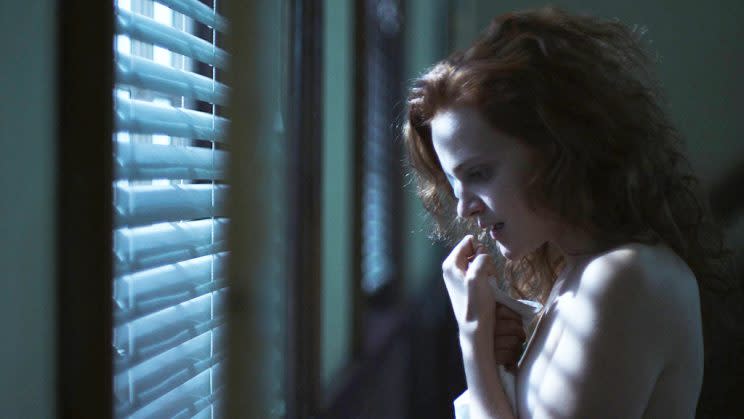‘The Handmaid’s Tale’ Postmortem: Elisabeth Moss and Yvonne Strahovski on the Heartbreak of ‘Birth Day’

Warning: This post about the “Birth Day” episode of The Handmaid’s Tale contains spoilers.
The birth of a child is generally a cause for celebration. That’s even true in a society as repressed as Gilead, where celebratory events are few and far between. The second episode of The Handmaid’s Tale, “Birth Day,” depicts in wrenching detail how a child enters this particular world, and generates both tears of joy… and tears of grief. This scene plays out in Margaret Atwood’s 1985 novel as well, but it comes much later in the narrative, at which point the reader is almost accustomed to the cruelties casually visited upon the female population of Gilead. By moving it up in the show’s timeline, the writers are able to provide an early window into the way class functions in this world as a means to divide women like Offred (Elisabeth Moss) and Serena Joy (Yvonne Strahovski), who, in another time and place, could be allies — if not friends.
“The class structure is nothing new,” Moss tells Yahoo TV of the strict divisions enforced between the Wives of Gilead’s most powerful men and the women that serve as Handmaids. “It’s existed for thousands of years and still exists. [“Birth Day”] shows that it’s not necessarily men against women. Not all the women [in Gilead] are being penalized. You could say the Wives have wonderful lives that haven’t changed that much. That’s very true of history: women in power can do quite well for themselves even if they’re on the wrong side.”
In “Birth Day,” both Offred and Serena Joy are summoned to attend the arrival of Gilead’s latest citizen, being brought into the world by Ofwarren (Madeline Brewer) — known as Janine in a previous life. While Offred joins her fellow Handmaids at Offwarren’s bedside, Serena Joy remains downstairs with the privileged Wives, who are re-enacting the labor playing out upstairs as a way of “legitimizing” the child’s identity. Later on, when the Handmaid is on the cusp of giving birth, the Wife sits behind the straining woman and mimes the final pushes of labor. It’s a moment that might have played as farce, and the dark humor of the situation wasn’t lost on Strahovski. “It was one of the harder scenes to wrap my head around,” she says. “A Wife giving birth when she’s not giving birth; it’s a ridiculous set-up, at least from where I’m standing. You’ve got a whole group standing around a woman who is pushing and panting like she’s in pain while the real business is going on [elsewhere].”

What’s decidedly not amusing is what happens after Offwarren gives birth to a bouncing baby girl. At first, every woman in that room — be they Handmaid, Wife or an Aunt like Lydia (Ann Dowd) — is united in fear that they’re witnessing a stillbirth, a too-common occurrence in this infertility-plagued society. Then the sound of a newborn cry echoes through the room, and their expressions turn ecstatic. But that sense of shared joy proves short-lived; even as Janine stares into her daughter’s eyes, the Wives are moving behind her to usher “Mom” into the bed, where the child is then presented to her. As that handoff occurs, the Handmaids cluster around Janine, seeking to provide comfort as the birth day celebrations continue as if she’s not even there.
“It’s this beautiful moment, and then you see Janine’s face just crumble,” says Moss. “It also shows what’s going on with these women. No matter whether you’re a Handmaid or a Wife, you’re bonded by the one thing everybody wants: a healthy baby. But if you have a healthy baby, you’re also faced with the fact that the child will be taken away from you. It will be ripped from your arms and you’ll have to move to a new home.”
Watching Ofwarren’s child be stolen from her triggers a memory from Offred’s own past, one that’s an extrapolation of a moment that appears fleetingly in Atwood’s novel. In the book, Offred recalls a time when her child was nearly kidnapped while she shopped at a grocery store. The show, meanwhile, flashes back to a pre-Gilead time when Offred still answered to June and has just given birth to her daughter, Hannah, in a hospital, rather than a stranger’s house. “When June had her baby, fertility was already dropping through the floor,” Moss explains. “So someone breaks into the hospital and tries to steal her baby. That scene is a great representation of what was happening [before Gilead] and the strange bond that forms between women because of it.”

For Strahovski, “Birth Day” speaks directly to the strange bond between Offred and Serena Joy, a character she sometimes struggled to portray. “I do not relate well to her,” the actress admits. “She’s mean, unapproachable and nasty, and a lot of crafting her was trying to figure out why she’s so mean.” That mean streak is on display earlier in the episode, when Serena Joy grudgingly offers Offred a cookie, as if she’s bestowing an unearned treat upon a pet that’s misbehaved. And Strahovski says that much of Serena Joy’s hostility towards her Handmaid extends from the fact that she recognizes the extent to which their fates are combined, as much as she’d like to imagine herself as the better woman. “The one thing Serena Joy holds onto is to have a baby. She has no other out; she can’t get divorced or walk away. And the only person who can give her that baby is Offred. So even though Serena Joy is at the top of the food chain, so to speak, she’s still in a cage.”
The first three episodes of The Handmaid’s Tale are currently streaming on Hulu. New episodes will be released every Wednesday.
Read More From Yahoo TV:
‘American Gods’ Series Premiere Recap: A Sexy, Gory Mashup of Genres
Review: Jiminy Glick Trashes Trump on ‘The Tonight Show’
How Old Are the Stars of ’13 Reasons Why’?
